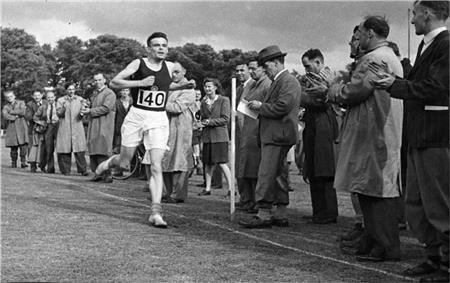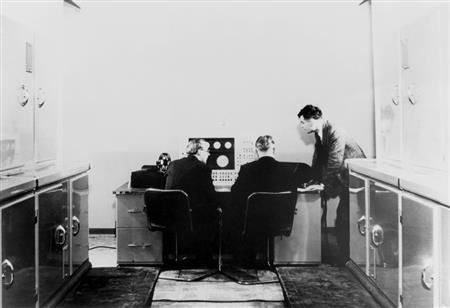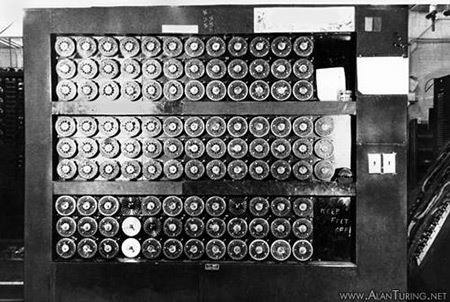 |
| A picture taken during a race of Alan Turing. (https://therunnereclectic.files.wordpress.com/ (therunnereclectic)) |
Our world is full of idols, celebrities, and pop culture figures, however, we don't often look under the hood and truly analyze a hero for the unique characteristics they have or selfless contributions to humanity they have made. I believe when you truly analyze a hero the traits they must have must include being a good role model and to be noble. People who fit this criteria can be found from the controversial whistle blowers to the brilliant scientists. The article, "Boy, Do We Ever Need A Hero" discusses heroes as people that we aspire to and help teach us how to live (Granger). Granger states, "Heroes arrive when we need them the most. They define us and point us in a direction... As long as we need examples of how to live, as long as we aspire, we will never be too old for heroes (Granger). This article defines heroes as people who inspire us and act as good role models. Although I believe the article, an additional criteria must be addressed that heroic traits are not defined by a single moment, but from constant acts of heroism they demonstrate from day to day. Heroes are found everywhere and although they may have imperfections, they still captivate us and push us to become better individuals. A hero can simply be defined as a good role model; someone who possesses great morals and is noble.
Additionally, Alan Turing kept a strong work ethic and differentiated himself in maths and sciences at a young age. "Alan Turing was born in London, England, on June 23, 1912. Both his parents had upper middle class origins, and his father continued that tradition as an administrator in the Indian civil service. With his father off in India, Turing was sent away to private boarding schools. After some early problems with social adjustment, he distinguished himself in mathematics and science" (Hodges). He continued on through his early adult years to write a paper covering the foundations of computing that would lead the forefront of Computer Science. "His most important mathematical work, "On Computable Numbers," was written in Cambridge in 1936" (Hodges). Later he dropped his work and sacrificed himself for his country to support the Allies in World War II. "He joined the Government Code and Cipher School in Bletchley Park, located between Oxford and London, where a massive effort was underway to break German codes which had been enciphered by machines" (Hodges). During the later end of his life when his sexual orientation was published he was ridiculed by the country he fought for. "In March 1952 he was prosecuted for his homosexuality, then a crime in Britain, and sentenced to a period of twelve months hormone 'therapy'" (Copeland). A hero must always obey their beliefs and never substitute them for evil or negligence. Strong morals are a definition of right conduct while being noble is where one is selfless and puts the furtherment of humanity before themselves. Alan Turing was more than a scientist; he was and continues to be a global influence because of his strong morals and noble traits.
 |
| Photo taken of Alan Turing and his colleagues. (http://d3i6fh83elv35t.cloudfront.net/newshour/wp-c (PBS)) |
For example, Alan Turing made great contributions to humanity due to his strong morals and ability to work hard. For instance Simon writes, "Upon completing his doctorate at Princeton University in 1938, Turing was invited to the Institute of Advanced Studies (also at Princeton) to become assistant to John von Neumann, the brilliant mathematician, synthesizer, and promoter of the stored program concept." (Simon). Alan Turing had a great work ethic that allowed him to study hard, attend Princeton, and work with the greatest genius of the 20th century. Alan Turing worked diligently for years to be able to gain his doctorate and then go to the Institute of Advanced Studies. He persevered against adversity and with a strong work ethic was able to achieve his dreams. Subsequently, Alan Turing was also very distinguished at a young age for providing important contributions to the college of his. "Educated at Sherborne School in Dorset, Turing went up to King's College, Cambridge in October 1931 to read Mathematics. He was elected a Fellow of King's in March 1935, at the age of only 22." (Copeland). Due to his amazing repertoire, good attitude towards science, and ability to work at high competency he was elected to a very prestigious club only for the most intellectual. To become a Fellow of King's you had to have made a distinguished service to the College. Alan Turing's work proved his ability to work hard and the support he showed his college. Alan Turing was a quintessential representation of a person with good morals and continued to prove his rock solid work ethic through prestigious awards one after another.
 |
| Photo of a "Bombe" used during World War II. (http://www.rutherfordjournal.org/images/TAHC_Bombe (rutherford journal)) |
Furthermore, Alan Turing also possessed the trait of being noble; one that truly set him apart and constituted to the saving of thousands of Allied lives. Alan Turing risked his life to join the World War II effort in Bletchley Park. "Turing arguably made a greater contribution to defeating the Nazis than Eisenhower or Churchill. Thanks to Turing and his 'Ultra' colleagues at Bletchley Park, allied generals in the field were consistently, over long periods of the war, privy to detailed German plans before the German generals had time to implement them." (History's HEROES from E2BN). Turing wanted to support the war effort but did not have the physical capacity to be of much support on the front lines, so he dropped his work and traveled to Bletchley Park to aid towards the war effort. Alan Turing had to drop his work to focus on the decryption of these German codes. He left he serene lab life and traveled to a dangerous location close to enemy front lines. Moreover, Alan Turing succeeded in his endeavors and was a major proponent towards using his new enigma cracking machine to help bring the end of the war. "Turing helped construct decoders (called Bombes) that could more rapidly test key codes until correct combinations were found, cutting the time it took to decipher German codes from weeks to hours. As a result, many Allied convoys were saved, and it has been estimated that World War II might have lasted 2 more years if not for the work at Bletchley Park." (Simon). Alan Turing decrypted these messages that allowed Allied forces to intercept Axis messages and save thousands of lives throughout the course of the war. Alan Turing did not have to sign up for the job but he did anyways to help save the lives of others. Thanks to his noble efforts thousands of lives were saved and further destruction was minimized.
In conclusion, after analyzing Alan Turing's life and contributions to humanity it is apparent that he embodied the characteristics of having strong morals and being noble. Alan Turing was awarded prestigious awards from his college at a young age. Due to his talent in the field of science and mathematics he studied alongside the greatest genius of the 20th century. He also was crucial towards decrypting the German enigma and bringing a much shorter end to the war. In accordance with this information I have found that Alan Turing inspires me because he always worked hard to benefit the furtherment of society. His work later caused him to be nominated as the Father of Computer Science and without his theories the world we live in would not exist today. He risked everything to become one of the staff in Bletchley Park and it was almost solely his work that cracked the German's decryption. Alan Turing was also found to be a homosexual and was greatly criticized after the war even though he made paramount contributions to its resolution. As Granger says "Heroes arrive when we need them the most. They define us and point us in a direction... As long as we need examples of how to live, as long as we aspire, we will never be too old for heroes" (Granger). Alan Turing was needed to save the war for the Allies and his work now inspires generations of young minds. Alan Turing is someone people will look up to for eternity and as long as we follow his ideals of having strong morals, and being noble, will we live good lives.
Works Cited
"Alan Turing." Alan Turing - Views and Opinions - History's HEROES from E2BN,
historysheroes.e2bn.org/hero/howviewed/91. Accessed 3 May 2017.
Copeland, Jack. "What Is a Turing Machine?" AlanTuring.net What Is a Turing Machine?, 1999,
www.alanturing.net/turing_archive/pages/reference%20articles/what%20is%20a%20turing%20machine.html. Accessed 29 Apr. 2017.
Hodges, Andrew. "Alan Mathison Turing." Encyclopedia of Science, Technology, and Ethics,
edited by Carl Mitcham, Macmillan Reference USA, 2005. Biography in Context,
link.galegroup.com/apps/doc/K3434900697/BIC1?u=powa9245&xid=48ad9c8d. Accessed 3 May 2017.
Simon, Marilyn K. "Turing, Alan." Mathematics, edited by Barry Max Brandenberger, Jr., vol. 4,
Macmillan Reference USA, 2002, pp. 111-113.
Gale Virtual Reference Library, go.galegroup.com/ps/i.do?p=GVRL&sw=w&u=pow
a9245&v=2.1&id=GALE%7CCX3407500308&it=r&asid=bc668994607008dd454b4b80bd3268ff. Accessed 29 Apr. 2017.
Granger, David. "Boy, Do We Ever Need A Hero (1).Pdf." Google, Google,
docs.google.com/viewer?a=v&pid=sites&srcid=cm91bmRyb2NraXNkLm9yZ3xtcnMtY
VyZXpvfGd4OjFjODdjNWVmM2JkMzRiNzI. Accessed 15 May 2017.Page created on 5/17/2017 12:00:00 AM
Last edited 5/17/2017 12:00:00 AM
